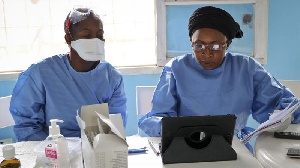Government has been urged to resource millet cultivators and develop improved seed varieties resistant to harsh climate conditions, particularly in northern Ghana, to encourage local farmers cultivate the cereal crop in large quantities.
Millet production has been treated or regarded as an “orphan” crop over the years due to inadequate attention it receives from government and the private sector as compared to other crops such as maize, groundnut, cowpea and rice.
Dr. George Y. Mahama, an Agronomist at the Wa Station of Savannah Agricultural Research Institute of Council for Scientific and Industrial Research (CSIR-SARI) made the call in an interview with the Ghana News Agency.
He maintained that when millet farming is given the needed local and national attention through injection of resources into its cultivation it would guarantee food security and improve livelihoods.
He said pearl millet for example has wide adaptability to the local environment and could be grown in areas that are very hot and dry and on soils too poor for maize and sorghum.
“Thus, pearl millet has the potential to enhance food security in semi-arid areas where maize and sorghum perform poorly,” he added.
SARI with support from the West Africa Agriculture Productivity Programme (WAAPP) released improved varieties of millet in 2015.
The varieties include Akad-kom, kanaati; Naad-Kohblug, WAAPNara and Afribeh Nara and were meant for cultivation in all five regions in north.
But, Dr.Mahamma noted that lack of government’s support for the production, processing and use of millet had led farmers to divert to cultivate other crops like maize.
He appealed to farmers to follow appropriate agronomic practices such as appropriate planting time and distance for the crop to enhance its yield.
The Policy Officer for Ghana Trade and Livelihood Coalition (GTLC), Mr Emmanuel Wullingdool, expressed regret that government had shown little interest in promoting the millet crop in terms of policy formulation.
He blamed the decline in millet farming to the drudgery involved in its cultivation coupled with the losses farmers incur in the harvesting and threshing process.
He noted that encouraging millet cultivation and consumption among the people could help reduce malnutrition among children since it had high nutritional value.
He called for appropriate attention from both government and the private sector in addition to favourable policy direction to encourage farmers in northern Ghana increase production.
Business News of Wednesday, 22 May 2019
Source: ghananewsagency.org













